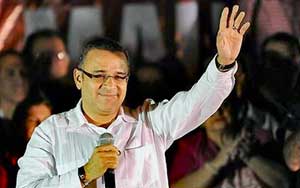El Salvador’s ‘date with history’
Published Jul 2, 2009 6:48 PM
By Oscar Faria
San Salvador, El Salvador
“And that wave of anger at its very limit, of yearning for justice, of
trampled rights that begin to rise from the soil of Latin America, that wave
could no longer be stopped. That wave of anger growing every day that passes
because that wave shapes the majority in all aspects, those who with their work
accumulate wealth, create values, make the wheels of history turn and who now
are waking up from the long, brutalizing sleep to which they have been
subject.”
Apparently the wave, which Commandante Ernesto Che Guevara spoke of at the
General Assembly meeting at the United Nations in 1964, arrived at the borders
of the Salvadoran Sea, when on June 1, Mauricio Funes took office as the head
of the smallest country in the Americas.
|
El Salvador President Mauritius Funes
|
“Funes! Funes! Funes!” shouted the sea of red, which vibrated with
the songs of the people–people who, under the trusteeship of the
right-wing party, saw their currency replaced by the dollar and fled to the
cities.
“Today is a day of hope and of joy,” commented one of the
supporters armed with a handkerchief on her head, an FMLN flag [Spanish acronym
for Farabundo Martí National Liberation Front], a Che shirt and vibrant
with an energy that she had maintained throughout the day while waiting for the
main event—“Chávez and Funes.”
The event began late, and when the masters of ceremony announced that it would
be only a few more minutes until Funes arrived, there were people with sad
faces leaving the celebration because they had been there for more than eight
hours awaiting the arrival of the new president, the first in El Salvador from
the left.
After revolutionary singers from Cuba and Mexico, President Daniel Ortega of
Nicaragua began his speech. Praising ALBA, PetroCaribe and the Central American
Union CA-4, he presented regrets from his counterpart Hugo Chavez, president of
the Bolivarian Republic of Venezuela. Chavez could not attend the event for
“security reasons of which we will not enter into detail,” said
Ortega. “The FMLN and FSLN [Sandinista Front] are brothers, not only
because our countries are brothers, but because we shared the same struggles
for more than 40 years.”
Cuban vice-Ambassador Esteban Lazo Hernandez declared: “Salvadoran
sisters and brothers, I am happy to express my gratitude and my congratulations
from our President Raul Castro, former-President Fidel Castro and all the Cuban
people.” He opened his speech expressing support to Funes and emphasizing
his happiness because finally, after 50 years, Cuba and El Salvador were to
resume political and commercial relations.
After a short but strong speech praising the FMLN and the struggle in Central
America for a Latin American union, Nicolas Maduro, representing Venezuela,
gave way to the main focus of the evening, President of El Salvador Mauritius
Funes.
“I could not govern this country, knowing that we did not have relations
with a country so filled with solidarity and as strong as is Cuba. I would be
ashamed to be president of a separatist country,” commented Funes, who
was about to resume relations with Cuba the same day that he took office.
From the beginning, Funes signaled that he was exhausted from his long day and
apologized for the delay in his arrival. He began his speech: “Thanks to
all who are here, to all the countries that have come to this celebration, to
this date with history.”
As Funes took the microphone and began to talk, the crowd, already diminished
by fatigue and a short rain typical of the Salvadoran winter, watched him.
“To fight against corruption, to fight against organized crime, a
government that always supports the poor and the needy before it takes care of
its family and/or the privileged groups”—these were the three
outstanding points of Funes’ speech that showed his political tendency or
indicated what might be the methodology of his government.
The new government must develop a new plan to confront the worldwide economic
crisis already reaching El Salvador—such as a new plan to arouse
activists to retake the reins of the destiny of the country. After more than 12
years of war and 20 years of rightist regimes, the people of El Salvador are
waking from a long and brutal sleep.
The writer is an activist and member of FIST–Fight Imperialism, Stand
Together–in Raleigh, N.C. This article was translated from
Spanish.
Articles copyright 1995-2012 Workers World.
Verbatim copying and distribution of this entire article is permitted in any medium without royalty provided this notice is preserved.
Workers World, 55 W. 17 St., NY, NY 10011
Email:
[email protected]
Subscribe
[email protected]
Support independent news
DONATE


